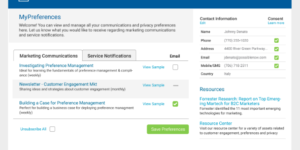Resource Center:
Blog
-
 How Can Organizations Ensure Ongoing Compliance with Consent Management?
PossibleNOW, Blog
How Can Organizations Ensure Ongoing Compliance with Consent Management?
PossibleNOW, Blog
To comply with evolving privacy regulations, organizations need to implement clear policies for collecting, storing, and updating customer consents while regularly reviewing systems for compliance gaps. By doing so, businesses not only mitigate legal risks but also build customer trust by demonstrating respect for their… Continue Reading
-
 Can Zero-Party Data Be Used for Targeted Advertising?
PossibleNOW, Blog
Can Zero-Party Data Be Used for Targeted Advertising?
PossibleNOW, Blog
View Post Yes, zero-party data can be used for targeted advertising, offering unparalleled precision without compromising privacy. Unlike third-party data, which is aggregated from external sources, zero-party data is willingly shared by customers themselves, including preferences, interests, and buying intentions. This data enables brands to… Continue Reading
-
 Are Purely Informational Texts Exempt from Consent Rules?
PossibleNOW, Blog
Are Purely Informational Texts Exempt from Consent Rules?
PossibleNOW, Blog
Yes, purely informational texts are generally exempt from certain consent rules under regulations like the Telephone Consumer Protection Act (TCPA). However, this exemption applies only when the texts strictly provide non-commercial, non-promotional information, such as appointment reminders or emergency alerts. If a message contains any… Continue Reading
-
 How Zero Party Data Aligns With Privacy Regulations
PossibleNOW, Blog
How Zero Party Data Aligns With Privacy Regulations
PossibleNOW, Blog
In a landscape defined by evolving privacy laws, zero party data offers a unique compliance advantage. This type of data, willingly and explicitly shared by customers, reduces dependence on less reliable third-party data. By directly obtaining consent and preferences from individuals, businesses meet stringent legal… Continue Reading
-
 Why Customer Preference Matters
pnadmin, Blog
Why Customer Preference Matters
pnadmin, Blog
How Innovators are Breaking Silos Do you really know your customers, what they want and don’t want? Do you know what they like and dislike? How about how they like to be contacted? Are you able to anticipate your customers’ needs to then satisfy them?… Continue Reading
-
 TCPA Regulations and Compliance: Complete Guide
pnadmin, Blog
TCPA Regulations and Compliance: Complete Guide
pnadmin, Blog
TCPA Policy Updates: Key Changes Telemarketers Must Know in 2025 Significant updates to the Telephone Consumer Protection Act (TCPA) among other regulations are set to take effect in 2025, introducing stricter regulations for telemarketers. These changes aim to tighten consent requirements and streamline revocation processes,… Continue Reading
-
 Defining Meaningful Metrics: 6 Soft KPIs to Measure Customer Preference Collection
PossibleNOW, Blog
Defining Meaningful Metrics: 6 Soft KPIs to Measure Customer Preference Collection
PossibleNOW, Blog
Measuring metrics and data can be overwhelming and confusing. Have you ever had trouble deciding where to start? Do you remember our previous blog series 5 Key and Measurable Reasons to Adopt Preference Management? We discussed some hard KPIs that may be the initial motivator… Continue Reading
-
 Email Preference Center Best Practices
pnadmin, Blog
Email Preference Center Best Practices
pnadmin, Blog
What Are Email Preference Centers? Email preference centers are a tool that can help your consumers decide how they want you to interact with them. Instead of just sending out emails on a regular timed basis, having a preference center allows customers to have more… Continue Reading
-
 The Basics of DNC Scrubbing: What Is a Do Not Call (DNC) Scrubber and Why Do You Need It?
pnadmin, Blog
The Basics of DNC Scrubbing: What Is a Do Not Call (DNC) Scrubber and Why Do You Need It?
pnadmin, Blog
What Is the Do Not Call (DNC) Registry? The Do Not Call Registry is a database of phone numbers and contact information maintained by the United States government’s Federal Trade Commission. The phone numbers on this registry have revoked consent to be contacted by companies… Continue Reading
-
 What is Consent Management, How it Works, & Why it’s Important for Data Compliance
pnadmin, Blog
What is Consent Management, How it Works, & Why it’s Important for Data Compliance
pnadmin, Blog
Just a few years ago, companies could obtain and monetize their customers’ data in any way they wanted. But with the recent rollout of the California Consumer Privacy Act (CCPA) and Europe’s General Data Protection Regulation (GDPR), companies can no longer gather personal data without… Continue Reading







